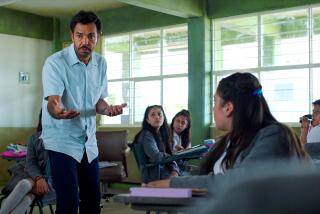Socializing Students for Anarchy
- Share via
In the corridors of a Brooklyn high school, a student gunned down two classmates. The principal, who had had 50 students die by gunfire in the previous five years, succinctly described the situation: “We are in a war zone.”
This highlights an ominous development in our schools. The incidence of school violence--of classroom terrorism, gang fights, the use of deadly weapons--has risen dramatically.
Paradoxically, this retrogression toward anarchy has occurred during the reign of “progressive” education, a philosophy that champions the “socialization” of children. According to founder John Dewey, “The school is primarily a social institution,” whose central purpose is not “science, nor literature, nor history nor geography . . . but the child’s own social activities.” Our schools certainly embrace both parts of this doctrine: Teachers now attend to the child’s “social” needs as devoutly as they dismiss his intellectual ones. Why, then, is social conflict rather than social harmony escalating?
The answer is: precisely because of this doctrine.
The “progressive” philosophy maintains that the cause of social strife is the unwillingness of an individual to sacrifice his convictions to the group. Dewey maintained that it is the insistence on distinctions such as “true versus false” and “right versus wrong” that generates social conflict. If only children did not hold strong ideas, disagreement and conflict would evaporate in the sunshine of social harmony. Truth, therefore, is socially fractious, while ignorance is bliss.
Hence what the “progressives” mean by “socialization” is the surrender of one’s mind, of one’s independent knowledge and judgment to a group consensus. According to Dewey, “The mere absorbing of facts and truths is so exclusively individual an affair that it tends very naturally to pass into selfishness. There is no obvious social motive for the acquirement of learning, there is no clear social gain in success thereat.” This explains why educational standards have plummeted over the years, why “progressive” teaching methods consist primarily of class discussions in which everyone’s arbitrary opinion is considered equally valid, and why Johnny can’t read, write, add or think.
Once truth and logic are dismissed, Johnny is left with one fundamental guide to making choices: his emotions. Explaining the “progressive” practice of engaging children in whatever “scientific experiments” they feel like doing, one teacher said: “If students enjoyed working with science-type materials such as magnets or mirrors, I really don’t care if they learned anything.” To which a principal replied: “As an educator, I fully agree with that view. As a parent, it scares me to death.”
He and we should be scared, because a child driven solely by feelings is like a vehicle out of control. Which feelings will guide him? The fear and anxiety generated by ignorance and cognitive incompetence? The frustration and rage felt when his desires aren’t immediately satisfied? The self-hatred that gets subconsciously projected at others? The false security offered by a gang? The desire to control others by force because of an inability to control reality?
What definitely won’t guide him is reason, which is why violence is on the rise. If people disagree on a certain issue, they can discuss it logically, adhering to facts to determine who is correct. If they fail to resolve the issue, they can at least agree that it is rational to respect the rights of others rather than resort to violence. Rational persuasion is thus the foundation of peaceful coexistence.
But by undermining reason, the “socialization” doctrine reduces people to the status of beasts, to slaves of their impulses, where no rational persuasion is possible. Their only ultimate recourse is to deal with each other by brute force.
If students are taught that mindless conformity to the group is a virtue, is it any surprise that they gravitate toward gangs? The solution to school violence is not school uniforms, as President Clinton proposes, or better computers, as the “technocrats” suggest. And it assuredly is not more “socialization” skills, as Atty. Gen. Janet Reno advocates. Schools need to teach cognition, not “socialization.” They need to encourage individual independent judgment. They need to provide the factual knowledge and the reasoning skills that a rational mind requires.
The only way to stop students from acting like animals is to regard them as thinking human beings.






